#Madame de La Fayette
Explore tagged Tumblr posts
Note
When in the library I found a novel with مدام لافييت "Madame de La Fayette" on it, and it got me excited even that it is more than probable that the author has nothing to do with the Lafayette I thought of, turns out there was a relation! I researched about a little while studying and apparently a woman in an older generation of La Fayette family (Marie-Madeleine Pioche de La Vergne, Comtesse de La Fayette) wrote it, her novel (La Princesse de Clèves (1678)) is considered the first french historical novel???? (basically historical fiction retelling with an OC).. she's not his grandmother or blood related in any way but I think it's a cool fact
Dear Anon,
that is indeed quite interesting, is it not?
Madame de La Fayette was the Marquis de La Fayette’s great-aunt (or there about, the family tree is a bit confusing around that time) by marriage, although her husband was not really a great catch. She published her books, most noticeable among them La Princesse de Clèves, anonymously but they were soon attributed to her. Her works in general and La Princesse de Clèves in particular, are a firm part of the French canon of classic literature.
Her main protagonists were all made up, but the setting and the supporting characters were all taken from history and the novel was lauded for its accuracy.
As far as I know, Madame de La Fayette’s works belonged to the first of its kind not only in France but in Western literature in general.
I hope you have/had a lovely day! :-)
#ask me anything#anon#marquis de lafayette#la fayette#french history#literature#madame de la fayette#la princesse de clèves
18 notes
·
View notes
Text

La Princesse de Clèves (1678) - Madame de La Fayette
Je n'ai que des sentiments violents et incertains dont je ne suis pas le maître. // My thoughts are violent and uncertain, and I am not able to control them.
#Madame de La Fayette#La Princesse de Clèves#The Princess of Cleves#french literature#novel#book#reading#roman d'analyse#Marie-Madeleine de La Fayette#women authors#Entsagungsroman#read in st louis and montreal#read in october 2023
4 notes
·
View notes
Text
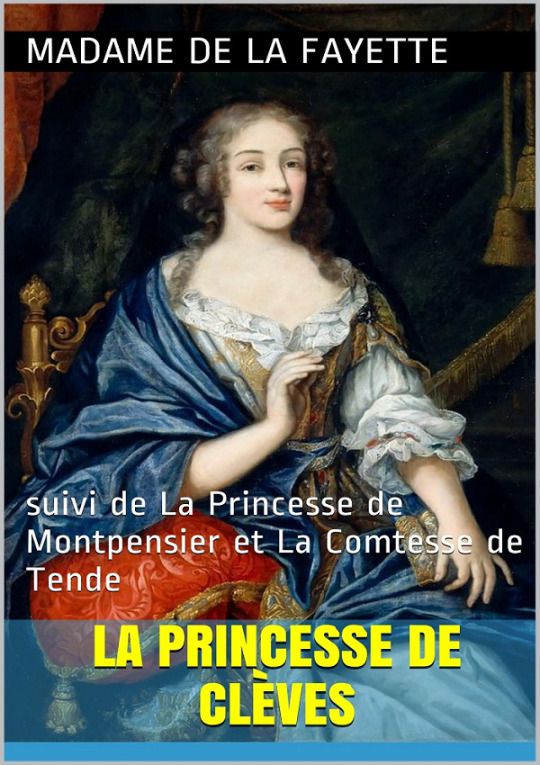
La Princesse de Clèves est un roman de la femme de lettres française Madame de La Fayette.
0 notes
Text

"Congratulations, Madame. It's a boy!"
"How should we name him, Mon Cherie?"
"Well I was thinking we should name him Marie-Joseph Paul Roch Gilbert du Motier De La Fayette Marquis De Lafayette."
"Babe, You're a genius!"
"I KNOW RIGHT! I didn't knew which name to pick so I decided to put them all in one because I'm so quirky in SUCH aristocratic way😝"
"Je t'aime, chienne."
"Je t'aime aussi, connard."
And then they both kiss.
No but seriously, Were his parents fucking high when they were naming him? 💀
#hamilton musical#musicals#alexander hamilton#hamilton#angelica schuyler#thomas jefferson#eliza schuyler#hamilton memes#schuyler sisters#lin manuel miranda#SoundCloud
28 notes
·
View notes
Text
“She felt that it was nearly impossible to be content with any love that he could give her. But even if I could be, she said to herself, what do I want with it? Do I want to allow it? Do I want to respond? Do I want to fail M. de Clèves? Do I want to fail myself? And finally do I want to expose myself to the cruel remorse, the deadly sadness which love brings in its train?”
- The Princess of Cleves, Madame La Fayette
2 notes
·
View notes
Text
“Vive La Reine!”

“I know the fate awaiting me”, the Queen replies, with magnanimity, “but my duty is to die at the feet of the king and in the arms of my children.” It is clear by her tone of voice, that she is frightened, but by God, she nonetheless behaves like every inch the Queen of old and noble France. You allow yourself a small smile, this might just work.
“Well then, madam, come with me”, you invite her and offer her your arm.
“What! alone on the balcony? Did you not see the signs they made me?”, she retorts, her eyes wide open and her face flushed with fear.
Of course have you seen the signs made, and they were horrible indeed. Nobody is deserving of such treatment, but this is exactly why you must act now. “Yes, madam, but let us go”, you tell the Queen and turn to look at the King. He simply nods.
You step out on the balcony with the Queen beside you and her small children, the Dauphin and the Princess Royal. But as soon as you step outside, there is an outcry from the people below the balcony to send the children back inside. Good, you think. At least then they are safe, at least they do not have to see their mother murdered should the events take a turn for the worse.
You try to address the people, but you can not make yourself heard, regardless of how much you strain your voice. Pity, you had, in the heat of the moment, come up with a few pretty things to say. But since speaking seems no longer to be an option, you decide to let actions speak for you. You bow down as low as you can in front of your Queen and give her hand a gallant kiss. Let the crowd see that you are still loyal to the Royal Family and the people will hopefully follow your lead.
It works. You hear the crowd below cry out: “Long live the General!” and “Long live the Queen!” You allow yourself the second little smile this morning as you lead the Queen back inside. That went down rather well. But there is still no ends to your troubles as the King approaches you. “What are you now able to do for my guards?”
His guards? Really now? You are a soldier, not a savior! What does he think you can do? There is nothing you can do for the King’s guards.
Well, appearing in front of the people on the balcony has worked twice so far and if the King asks you, you are willing to try it a third time. Surely you will be able to coax the National Guard into a display of camaraderie.
Historical Context:
Again, this scene happened almost exactly as described here. La Fayette later noted in his Memoirs:
(…) and when the king and his family; after having promised to go to Paris, had retired from that balcony, “Madame,” said he to the queen, “what are your intentions as respects yourself?” “I know the fate awaiting me,” she replied, with magnanimity, “but my duty is to die at the feet of the king and in the arms of my children.” “Well then, madam, come with me.” “What! alone on the balcony? Did you not see the signs they made me?” And those signs had been horrible, in truth. “Yes, madam, but let us go.” And when, appearing with her before that tumultuous populace, still raging, like the waves of a stormy ocean between a hedge of national guards, who lined three sides of the court but could not control the centre, Lafayette, unable to make himself heard, had recourse to a decisive but hazardous sign; he kissed the hand of the Queen. The multitude, struck by that action, exclaimed, “Long live the general!” “Long live the queen!”
Marquis de La Fayette, Memoirs, Correspondences and Manuscripts of General Lafayette, Vol. 2, Craighead and Allen, New York, 1837, p. 327.
#there is cromwell#choose your own adventure#alternate history#history#french history#french revolution#1789#marie antoinette#louis xvi#macrh of the women on versailles#marquis de lafayette
9 notes
·
View notes
Text
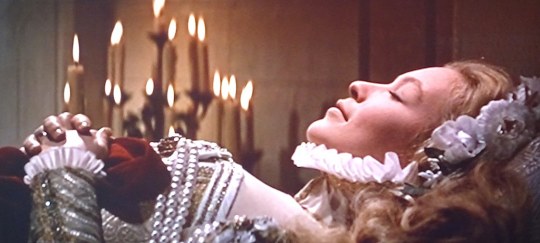
Marina Vlady dans "La Princesse de Clèves" de Jean Delannoy (1961) - adapté du roman éponyme de Madame de La Fayette qui se situe à la cour des Valois dans les dernières années du règne du Roi Henri II (1678) - décembre 2023.
3 notes
·
View notes
Text
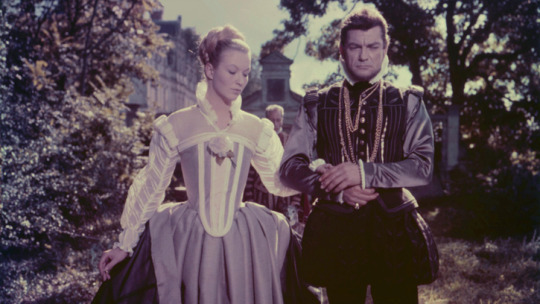
art | Jean Cocteau retrospective at Cinemateque Bercy (November 15 - 26)
To mark the 60th anniversary of his death, there is a launch of tribute to Jean Cocteau at Parisian Cinemateque . Poet, then poet-filmmaker, preferred to call himself a cabinetmaker, who shot films like others turn tables. The first magic trick, The Blood of a Poet, will be followed by seven other films, including Beauty and the Beast and Orpheus, all to be seen again on the big screen. A retrospective completed by his work as a screenwriter (The Phantom Baron) and dialogue writer (Les Dames du bois de Boulogne), less often celebrated, no less astonishing.
With the support of CHANEL
Nov 23, 6:00 p.m.
The Princess of Cleves, session presented by Marina Vlady Based on the novel La Princesse de Clèves by Madame de La Fayette. With Marina Vlady, Jean Marais, Jean-François Poron.
Against a backdrop of intrigues at the court of the Valois, the amorous torments of a princess (Marina Vlady), who unleashes her husband's jealousy: some 20 years after L'Eternal Return, the Cocteau/Marais/Delannoy trio reforms around the romantic drama by Madame de La Fayette.
2 notes
·
View notes
Text
Nicholas Fish to Elizabeth Hamilton, [March 22, 1822]
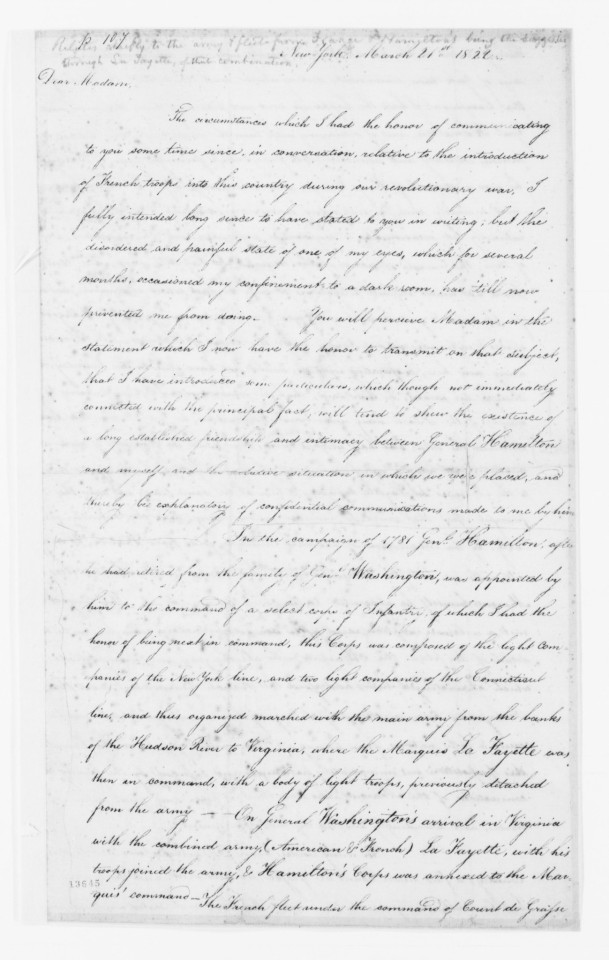


22 March, 1822 Dear Madam, The circumstances which I had the honor of communicating to you some time since in conversation, relative to the introduction of French troops into this country during our revolutionary war, I fully intended long since to have stated to you in writing, but the disordered and painful state of one of my eyes, which for several months, occasioned by confinement to a dark room, has till now prevent me from doing. You will perceive Madam in the statement which I now have the honor to transmit on that Subject, that I have introduced some particulars, which though not immediately connected with the principal fact, will tend to show the existence of a long established friendship and intimacy between General Hamilton and myself and the relative situation in which we were placed, and thereby be explanation of confidential communications made to me by him. In the campaign of 1781 Genl. Hamilton, after he had retired from the family of Genl. Washington, was appointed by him to the command of a select corps of Infantry, of which had the honor of being next in command, this Corps was composed of the light companies of the New-York line, and two light companies of the Connecticut line, and thus organized marched with the main army from the banks of the Hudson River to Virginia, where the Marquis La Fayette was then in command, with a body of light troops, previously detached from the army—On General Washington's arrival in Virginia with the combined army, (American & French) La Fayette, with his troops joined the army, & Hamilton's Corps was annexed to the Marquis' command—the French fleet under the command of Count de Grasse having arrived in the Chesapeak to co-operate with the combined army, the siege of York-town commenced; during which, and throughout the whole of that Campaign, I had the happiness and good fortune of being the mess mate of Genl. Hamilton, and of occupying with him the same tent—this added to our previous intimacy and uninterrupted friendship from the year 1775, when he was a student of King's College, and where with a few others we had formed a weekly club, for improving ourselves in debating & public speaking, naturally led occasionally to confidential and unreserved conversations; in one of these, the General speaking of the Marquis La Fayette, said, The United States are under infinite obligations to him beyond what is known, not only for his valor & good conduct as Major Genl. In our army, but for his good offices & influences in our behalf with the court of France—the French army now here, co-operating with us, would not have been in this Country, but through his means, he then said, that for some considerable time previous to the arrival of the French army under Count Rochambeau; he Genl. Hamilton had conceived the idea, and had weighed in his own mind the propriety of such a measure, and having satisfied himself on that subject, he had suggested the idea to the Marquis La Fayette, expressing to him at the same time, not only the powerful effect that would be produced in our army, and the Country generally, by the introduction of a small military force from France, to cooperate with us, but the increased effect that would result, should the Marquis himself be appointed to the chief command—This project met a welcome reception, and after some remarks, as to the details of the plan, the Marquis with all the zeal and promptitude which characterized him, addressed the French Government, and their Ambassador here, on the subject, urging the advantages which would result to both nations, from having a French military force in this Country; this proposition was immediately patronized and inforced by the family & connections of the Marquis, who were then in power and great influence in France, and accordingly adopted by that Government.
An army under County Rochambeau was sent to this Country: a fleet under County de Grasse, was also sent, and the capture of Lord Cornwallis' army which terminated the war, and sealed our Independence, was the consequence—As the idea of introducing into this country, a small auxiliary army from France, first presented itself to the mind of Genl. Hamilton, as avowed by him to me, and possibly not communicated by him to any other friend, I deem it a duty incumbent on me, and a tribute due to his memory, that the knowledge of that fact should not be lost, but be preserved and recorded as an additional evidence of his brilliancy of imagination and preeminent services to his Country. When the siege of York town had commenced, our first parallel line was thrown up, it became evident, that the two Redoubts which Lord Cornwallis had constructed in front of the town, would prolong the siege, until they could be allowed by our cannon, or taken by storm; the former of these methods would probably have been preferred and preserved in with confidence of ultimate success, had not the French Admiral announced his wish to return with his fleet to the West Indies, intimating that circumstances would compel him to depart in a few days—thus circumstanced Genl. Washington and induced to change his plan of regular approaches, for the more expeditious one of storming those works-to this end an arrangement was made that one Redoubt should be attacked by a column of American light Infantry, and the other by a column of French Grenadiers. The command of the American Infantry consisting of two Battalions one commanded by Col. Gemat, the other by myself—was given to Genl. Hamilton, and a signal from our grand battery answered by a correspondent signal from the French battery, put the two columns of attack immediately in motion. The American Infantry animated by the address and example of their leader, marched to the attack, with Muskets unloaded and Bayonets fixed relying on their Bayonets alone for success; they soon arrived at the counterscarp, under a heavy and constant fire from the redoubt, which they bravely sustained, and surmounting all difficulties and impediments of abattis, ditch and palisade mounted the parapet and took possession of the work together with those who had defended it, and Major Campbell the commanding Officer; all this was effected agreeably to previous arrangement made by Genl. Hamilton; and his troops regularly formed within the Redoubt and order completely restored, while the other column, whose mode of attack was different, were yet engaged in the conflict.
I have the honor to be With great respect Dear Madam Your friend & humble servant
Nichs. Fish
#hamilton correspondence#fish correspondence#elizabeth hamilton#elizabeth schuyler#nicholas fish#1822
8 notes
·
View notes
Text
okay...
You unleashed my fury now :
Úrsula K Le Guin
Ann Radcliffe
Agatha Christie
Jane Austen
Colette
Margaret Cavendish (first science fiction female autor ever? Like Hello???? )
Christine de Pizan
Margaret Atwood
Charlotte Brontë
Anne Brontë
Emily Brontë
Virginia Wolf
Octavia Estelle Butler
Gertrude Stein
Edith Wharton
Angela Carter
Isabel Allende
Doris Lessing
Elena Ferrante
Louisa May Alcott
Lucy Maud Montgomery
Madame de La Fayette
Anne Bradstreet
Fred Vargas
Madeleine de Scudéry
Madeleine de L'Aubépine (earliest female erotic poet)
Charlotte Saumaise de Chazan
Anne Desclos
George Sand
Virginie Despentes
Gloria Steinem
Mary Shelley wrote Frankenstein and basically half invented science fiction as we know It now, but okay...🙄 Also she totally Lost her virginity on her moms grave , like DAMN.
SIMONE DE BEAUVOIR!!!!!!!!!!!!!!
Ughhhhhh
Annie Ernaux
Françoise Sagan
Anna Gavalda
Emilia Pardo Bazán
Elvira Lindo
María de Zayas y Sotomayor
Teresa of Ávila
Hrotsvitha of Gandersheim
Clare Booth Luce
Sophie Treadwell
Aphra Behn
Enheduanna
Mary Ann Evans (George Eliot)
Margaret of Valois
Alice Bradley Sheldon (James Tiptree Jr)
Madame or Countess d'Aulnoy (invented the term “conte de fée” or fairytale, you all!!)
Marie de France (first female autor in french ever that we know of)
And almost every single text / nivel signed by Anonymous IS suspected to be female written.
....All of this to say to that Twitter user : Fuck off!

Can’t believe Jane Austen wrote Pride and Prejudice in the 2000s
And in 2015 Emily Brontë released literary clsssic Wuthering Heights
Thank God someone paved the way for them…
133K notes
·
View notes
Text
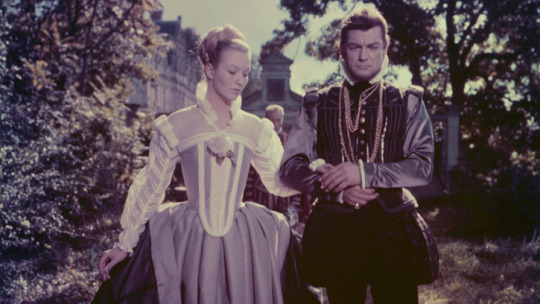
art | Jean Cocteau retrospective at Cinemateque Bercy
To mark the 60th anniversary of his death, there is a launch of tribute to Jean Cocteau at Parisian Cinemateque . Poet, then poet-filmmaker, preferred to call himself a cabinetmaker, who shot films like others turn tables. The first magic trick, The Blood of a Poet, will be followed by seven other films, including Beauty and the Beast and Orpheus, all to be seen again on the big screen. A retrospective completed by his work as a screenwriter (The Phantom Baron) and dialogue writer (Les Dames du bois de Boulogne), less often celebrated, no less astonishing.
With the support of CHANEL
Nov 23, 6:00 p.m.
The Princess of Cleves, session presented by Marina Vlady Based on the novel La Princesse de Clèves by Madame de La Fayette. With Marina Vlady, Jean Marais, Jean-François Poron.
Against a backdrop of intrigues at the court of the Valois, the amorous torments of a princess (Marina Vlady), who unleashes her husband’s jealousy: some 20 years after L'Eternal Return, the Cocteau/Marais/Delannoy trio reforms around the romantic drama by Madame de La Fayette.
0 notes
Text
The Story of Adrienne (1800) and Pauline (1797)


I often go on and on about how fascinated I am by the time the La Fayette’s and the Noialles’ spend in exile at the estates Wittmoldt and Lehmkuhlen. Many modern books and publications cover this episode only sparsely – and to be honest, at first glance, events like the American and French Revolution for example appear to be the more interesting, more important and more dramatic chapters in La Fayette’s life. I would like to make the point, that the families time in exile should not be underestimated and that many things happen there, that profoundly influenced the La Fayette’s and their kin. This episode is also a fine example of the family interacting with people outside their usual sphere. People from a different country, a different culture, often with different perceptions.
The other day I was reading a book about Wittmoldt, both the Wittmoldt estate as well as the small village by the same name nearby. The book was written by the head teacher of the local school and a large part of his book deals with the school, its pupils and former teachers throughout time. The book mentions a former head teacher, Detlef Ludwig Petersen, who lived at the Wittmoldt estate during a time where Wittmoldt had many different owners and inhabitants – Madame de Tessé, Adrienne de La Fayette’s aunt, among them.
Now, what is so special about Petersen? He and his wife had four children. Three of them were born in Güsdorf, a neighbouring village, before the Petersen’s moved to Wittmoldt. While living at the Wittmoldt estate they had one last child, a daughter named Adrienne Pauline. My interest was immediately peaked since the name was not only very French – in contrast to the very German names of the first three children, but also the names of the French inhabitants of Wittmoldt at the time.
La Fayette’s wife and her aunt were both named Adrienne and there was also a younger sister, La Fayette’s sister-in-law, who stayed at Wittmoldt and that was named Pauline. This could hardly be a coincidence! I had a look at the archival records and found the entry of Adrienne Pauline’s baptism.
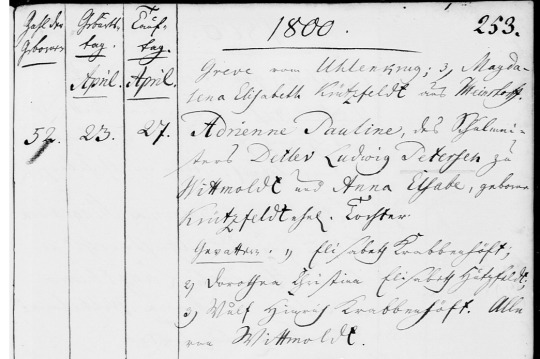
Landeskirchliches Archiv der Evang.-Luth. Kirche, Kirchenkreis Plön-Segeberg, Plön, Taufen 1764-1800, p. 247.
The child was born on April 23, 1800 and baptised four days later on April 27.
But wait! That is not all!
While going through the records, I found a second child with a name too extraordinary to be a coincidence.
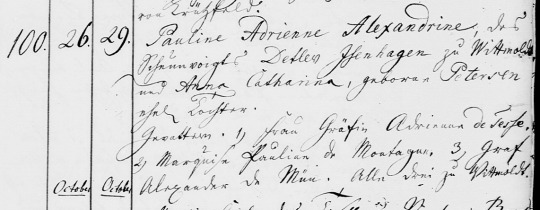
Landeskirchliches Archiv der Evang.-Luth. Kirche, Kirchenkreis Plön-Segeberg, Plön, Taufen 1764-1800, p. 203.
Pauline Adrienne Alexandrine was born on September 23, 1797, and baptised on September 29. Not only is her name a direct reference to the two sisters and their aunt, but the record also reveals that both Madame de Tessé, as well as Pauline, Marquise de Montague were witnesses to the proceedings.
The name of Pauline Adrienne Alexandrine’s father does not ring a bell for me, but her mother’s maiden name was Petersen. Now, Petersen is and always has been a very, very common German surname and therefor this could be two different Petersen-families. But Wittmoldt is still a very small village with few inhabitants and things were not looking any different at the turn of the 19th century. It is therefore entirely possible (and in my opinion quite likely) that not one, but two couples in the Petersen-family decided to name their daughter after Adrienne and Pauline.
(I think that the Adrienne, Madame de Tessé, played a bigger role here then Adrienne, Marquise de La Fayette since de Tessé owned Wittmoldt, lived there longer than her niece and was directly referred by name in the records of the 1797 baptism.)
This might not be a big and flashy story compared with some of La Fayette’s exploits during the American Revolution for example, but I like to believe that this is a very human story. The little things, the silent connections that speak of respect and intimate relationships - stories that are history without making history.
#marquis de lafayette#resources#la fayette#lafayette#french history#american history#history#french revolution#madame de tessé#pauline marquise de montague#1797#1800#detlef ludwing petersen#wittmoldt#lafayette in exile
18 notes
·
View notes
Text
"If you judge from appearances in a Court,” replied Madam de Chartres, “you will often be deceived; truth and appearances seldom go together."
— Madame de La Fayette, The Princess of Cleves
0 notes
Text
MADAME DE LA FAYETTE // AUTHOR
“She was a French writer; she authorised La Princesse de Cleves, France’s first historical novel and one of the earliest novels in literature. Three works were published posthumously: La Comtesse de Tende (1718), Histoire d’Henriette d’Angleterre (1720), and Mémoires de la Cour de France (1731).”


0 notes
Text
Anonymous- The Principal Upanishads
Sun Tzu- The Art of War
Plato- Republic
Ovid- Metamorphoses
Lucian- A True Story
Theri- Therigatha
Bede- The Ecclesiastical History of the English People
Attar of Nishapur- The Conference of the Birds
Maimonides- The Guide for the Perplexed
Lady Nijo- Confessions of Lady Nijo
Margery Kempe- The Book of Margery Kempe
Abul Fada’il ibn al-Assal- Fetha Negast
Ludovico Ariosto- Orlando Furioso
Bartolomé de las Casas- A Short Account of the Destruction of the Indies
Teresa of Avila- The Way of Perfection
Madame de la Fayette- The Princesse de Clèves
Jonathan Swift- Gulliver’s Travels
Cao Xueqin- The Story of the Stone
The Brothers Grimm- Children’s and Household Tales
Alexander Pushkin- Eugene Onegin
Rifa’a Rafi al-Tahtawi- Account of a Stay in Paris by an Egyptian Cleric
Elizabeth Gaskell- North and South
Émile Zola- Germinal
James Joyce- Ulysses
heres my 2024 reading list. subject to change at any point before midnight january 1st 2024.
1 note
·
View note
Video
youtube
Madame de La Fayette Sa vie -
E LA STORIA DI ENRICHETTO E TUTTTI I CATTOEBREI LA RISCRIVEREMO NOI
Marie-Madeleine seguì il patrigno nel suo esilio e ritornò a Parigi solo per il matrimonio con François Motier, conte di La Fayette.
diciotto anni più vecchio di lei, nacquero due figli. Per i primi anni i due vissero insieme in campagna. Successivamente Marie-Madeleine tornò a Parigi e, divenuta dama di corte di Enrichetta d’Inghilterra, visse separata da suo marito, anche se mantenne sempre con lui dei rapporti di amicizia e continuò ad aiutarlo ogni volta che fu possibile, fino alla morte di lui, avvenuta il 26 giugno 1683.
Attraverso la cugina Marie, conobbe François de La Rochefoucauld, al quale rimase legata per tutta la vita da un'affettuosa amicizia e da un'ancor più intensa complicità intellettuale. In compagnia dello scrittore frequentò tutti i salotti culturali di Parigi, confrontandosi con i maggiori intellettuali dell'epoca, come Jean Racine e Nicolas Boileau.
Negli anni seguenti furono scritte le Mémoires de la Cour de France pour les années 1688 e 1689, pubblicate però dopo la morte della scrittrice, avvenuta a Parigi nel 1693.
Tra le altre opere narrative e memorie della Corte di Francia, è degna di nota la Storia di Enrichetta di Inghilterra, scritta insieme alla stessa Enrichetta Anna Stuart e stampata postuma nel 1720.
(L'ipocrisia è un omaggio che il vizio rende alla virtù.)
François de La Rochefoucauld
❤️❤️❤️❤️❤️❤️❤️❤️❤️❤️❤️❤️❤️❤️❤️❤️❤️❤️❤️❤️ ❤️❤️
#gustavopetro #colombia #DONALDTRUMP #TRUMP #BOLSONARO #DORIGHEZZI #STRISCIALANOTIZIA #FRANCESCO #RUTELLI #PROPAGANDALIVE #ELUANA #ENGLARO #ELUANAENGLARO #CRISTIANODEANDRE #twitter #facebook #skyrock #linkedin #instagram #okru #tiktok
0 notes